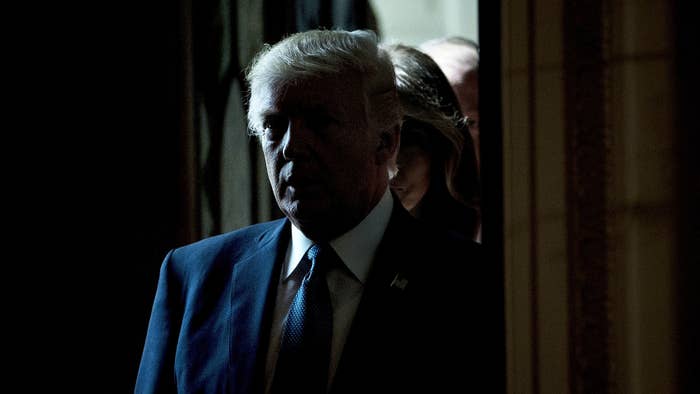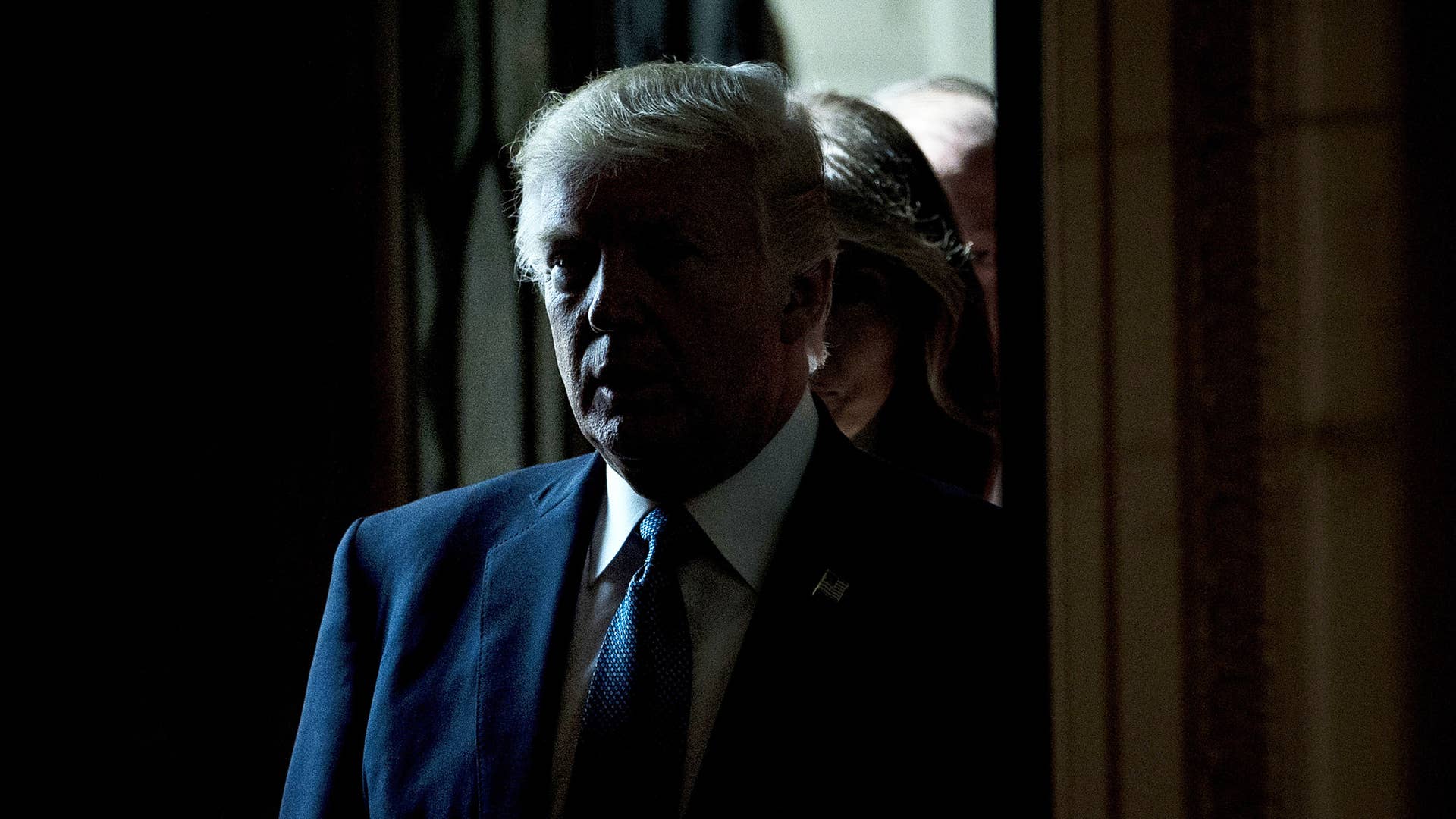
Donald Trump tried to grab headlines one more time on his way out of office this week. And yet again, it involved rappers. The former president issued 70 commutations and 73 pardons, including two to Lil Wayne and Kodak Black. There had been speculation that this would happen, after both rappers endorsed him in the days leading up to the 2020 presidential election.
Kodak will soon be home from a federal weapons charge that he was initially to be released from in 2022. Wayne will no longer face time after pleading guilty to his own weapons charges late last year. Both men likely have their lawyer (and Trump ally) Bradford Cohen to thank. In a vacuum, the optic of the President getting involved in rappers’ gun cases is pretty surreal. George W. Bush did pardon rapper John Forte in 2008, but that was an anomaly. For Trump, however, spectacle-stirring associations with rappers have been par for the course.
It says a lot about the collective politics of the rap world, a Black space, that Trump was somehow a polarizing figure instead of a universally hated one. There was YG’s anti-Trump anthem (“FDT”) and Busta Rhymes’ reference to the “Agent Orange administration,” but there were also supporters like Kanye West, and the on-the-fence observers who uttered variations of “at least he’s being honest about being a racist.” In lieu of policy, he communicated with Black America through rappers. He made a call to get A$AP Rocky freed from a Swedish jail in 2017, invited Kanye West to the Oval Office, let “Lil Pimp” speak at one of his 2020 campaign rallies, and has now pardoned Wayne, Kodak, Death Row Records co-founder Michael “Harry-O” Harris, and Roc Nation CEO Desiree Perez. From Trump’s perspective, these were all low-risk moves that could only gain him favor.
As he transitions out of office, there has been rampant discussion about what Trump’s next moves will be. Maybe he’ll create a political party and get himself ready for a 2024 presidential run. Or maybe he’ll delve back into the celebrity netherworld that he previously existed in, running the reality show and celebrity roast circuit, as infamous American figures often do. Whatever he does, he’ll do it with goodwill from those who appreciate how he looked out for their rap faves. His moves have nothing to do with justice or doing the right thing; everything he does is for his own benefit. Going forward, we should reflect on how many of his moves have been favors for beloved Black men who align with his conservative politics, and why his reverence in rap was harmful in the first place.
Neither Wayne or Kodak likely care what Trump’s motives are; they just care that their carceral experience is over (although Kodak still faces up to 30 years in prison for charges in a South Carolina sexual assault case).
Wayne was facing 10 years after federal agents found a gun in his luggage during a search of his private jet at Miami’s Opa Locka Executive Airport. He was charged with criminal possession of a firearm and ammunition as a prior felony offender (he previously pled guilty to gun possession in New York in 2009) before pleading guilty to the Miami charge in December 2020. But a month before that, he met with President Trump in the White House to endorse the Platinum Plan, which was purportedly set to offer $500 billion to the Black community. “Just had a great meeting with (President Donald Trump) besides what he's done so far with criminal reform, the platinum plan is going to give the community real ownership,” Wayne tweeted, sharing a photo he took with Trump.
People immediately made the links between his federal case and Trump endorsement. And while those may now dismiss his Trump meeting as simply a case of doing what he had to do to, it’s also worth noting why Trump may have felt that Wayne would be receptive to him in the first place. Wayne has previously theorized that “racism doesn’t exist” and disparaged the Black Lives Matter organization in 2016 by expressing, “I don’t feel connected to a damn thing that ain’t got nothin’ to do with me,” and, “If you do, you crazy as shit.” Both comments are Trump-like.
Kodak Black has had his fair share of facepalm-worthy quotes, as well. He tweeted an endorsement of the Platinum Plan last October, and got a pardon in exchange. He’s been colorist in his music, rapping “Where them yellow bones? / I don’t want no Black bitch / I’m already Black.” He harassed Young MA by rhyming, “I'm fuckin' Young M.A, long as she got a coochie” in 2019. He was also insensitive about wanting to date Lauren London immediately after Nipsey Hussle’s death. And beyond words, he’s accused of assaulting a then-high schooler in South Carolina in February 2016. He’s still facing trial for the charge. It says a lot about the widespread disregard for sexual violence survivors that those celebrating his impending release haven’t mentioned that case. Perhaps Trump, who has millions of supporters despite 63 accusations of sexual misconduct of his own, saw an opportunity to appeal to those people through Kodak. It helped both mens’ cause that their lawyer Bradford Cohen is a friend of Trump’s, who previously appeared on The Celebrity Apprentice.
Before Trump became a despotic president, he was revered by rappers as a figure of opulence. There’s an incalculable number of shoutouts to Trump, simply for being a rich white man. There are hundreds of wealthy American entrepreneurs, but rappers helped give Trump a special kind of pop culture relevance, which he rode into political relevance. Like so many rappers, he maintained his riches by serially branding himself in an effort to make a dollar. When the rap game merely knew him as a wealthy man, it was cool to want to be “up like Trump.” But his policies and hateful rhetoric illuminated the links between capitalism and suffering in a way we can never forget. Being powerful in America, you take advantage of the powerless, and to maintain wealth, you exploit people you probably don’t care about. If you’re Jeff Bezos, that manifests through overworking and underpaying Amazon employees. If you’re Trump, and get to apply that mindset to government policy, your decisions end up infringing on literally every marginalized group for the benefit of your rich friends (including entertainers).
Wayne spent years telling us that if it wasn’t about his money, he didn’t care. And now, thanks to Trump, we’ve realized he wasn’t just rapping. Trump’s alliance with certain rappers isn’t always as cut and dry as Kanye wanting attention or Wayne wanting his freedom. These men all aligned along the lines of riches, disregard for women, and flawed conceptions of racism. Their shared “values” are no coincidence. The millions of people who support them, and those who joked about becoming MAGA after Trump freed Kodak, reflect the same frayed political scope. These are the people who will help Trump reassimilate into the entertainment world if he so chooses. 10 years from now, these fans will remember the pardons, but they might not remember that Trump resumed federal executions after a 17-year halt and callously allowed 13 people to be executed on his way out (more than any president in 120 years). They also might forget that he asked the Supreme Court to stop releasing incarcerated people who are at risk of contracting COVID-19, a decision that likely resulted in more deaths.
Snoop Dogg called the Trump administration about clemency for Death Row co-founder “Michael Harry O” Harris. And after the pardon was granted, Snoop said, “They did some great work while they was in there and they did some great work on their way out. Let them know that I love what they did.” But in 2019, he said “fuck Trump” because he didn’t care about “honest, blue-collar, hard-working people.” Trump hasn’t even been out of office for a day and the rewriting of history has started—expedited by a favor.
In America, money, power, celebrity, and pageantry takes precedence over the people. And sadly, the everyday people that this dynamic weighs on are the ones who uphold it. If the cult of celebrity didn’t exist, there wouldn’t be space for them to hold sway over our political opinions, and there wouldn’t be an opportunity for politicians to use alliances with them to distract from their terrible policies. But instead, we live in a world where Trump can use the currency of celebrity for mutually beneficial transactions with stars who share his misogyny and capitalistic greed. He can attempt to use a few choice pardons to absolve himself of complicity in upholding the prison industrial complex.
If Trump truly cared about looking out for Black people, he would have pardoned political prisoners incarcerated in the federal system. But even the thought of that is laughable. So, how do we get to a better place? It will take more widespread political education to help people truly understand the links between presidential office and worldwide suffering. And it will take a renewed perspective of celebrity that doesn’t entail absolving a president’s human rights abuses because of how they helped your favorite star.

